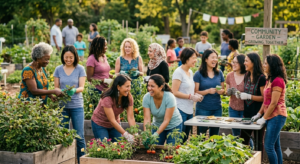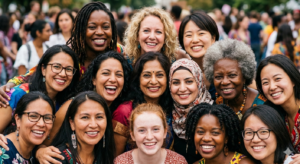By Ikupolusi Ariyike
We’ve all heard the age-old adage, “charity begins at home.” Sometimes, it can sound like a parochial excuse, a way to shrug off larger global issues in favor of smaller, more manageable ones. But what if we’ve been misinterpreting this classic piece of wisdom? What if it isn’t about limiting our care, but about understanding the very nature of compassion itself?
At its core, “charity begins at home” is not just a saying; it’s a training ground. It’s the principle that the muscle of empathy is first strengthened in our immediate surroundings with our family, friends, and in our local communities. It’s where we learn the language of selfless giving, so we can eventually speak it fluently on a global scale.
The Home as a Practice Ground
Think of your home as a microcosm of the wider world. The lessons we learn here are fundamental:
Empathy in Action: Listening to a family member’s tough day without judgment is an act of charity. Helping a sibling with homework or taking on a chore to ease a parent’s load teaches us to see the needs of others and respond with kindness.
The Spirit of Giving Without Expectation: True charity isn’t transactional. The simple, unconditional support we offer within our homes forms the blueprint for giving without desire for recognition or reward.
Building a Foundation of Stability: A supportive and compassionate home environment creates emotionally secure individuals. You cannot pour from an empty cup. By fostering charity at home, we ensure that we, and those we raise, have the emotional resilience to help fill the cups of others.
The Ripple Effect: From Home to Community
When we cultivate this spirit of giving within our households, it naturally spills out into our communities. This is where the “power of giving back” truly ignites and becomes a tangible force for change.
The local community is the perfect bridge between the personal and the global. Giving back here creates a visible, immediate impact that reinforces the value of our efforts. This can look like:
Supporting a local cause: Volunteering at a community garden, a food bank, or an animal shelter.
Shopping small: Choosing to buy from local businesses and farmers, which strengthens the local economy, is a form of financial charity that keeps your community thriving.
Simple neighbourly kindness: Checking in on an elderly neighbour, lending a tool, or organizing a street clean-up.
These acts create a powerful ripple effect. They build social bonds, create networks of support, and foster a sense of shared responsibility. A community that takes care of its own is stronger, more resilient, and more compassionate. This localized kindness is the proving ground for the broader empathy required to tackle larger, more complex global issues.
The Unlimited Capacity of the Heart
This is the most beautiful part: charity is not a finite resource. The love and care we cultivate at home does not diminish when we extend it to our community; it multiplies. And that expanded capacity doesn’t shrink when we feel called to support a cause on another continent.
The same heart that remembers to call a lonely relative is the heart that aches for victims of a natural disaster overseas. The same hands that cook a meal for a sick friend are the hands that are eager to pack boxes for international aid. The mindset of giving, once nurtured, knows no geographical boundaries.
Charity begins at home, but it does not end there.
It is a journey that starts in the heart of our personal lives, expands to the streets of our neighborhood, and ultimately extends to the farthest reaches of our world. It is understood that by starting small with intention, empathy, and consistency, we build the foundation for a lifetime of impact.
So, let us never underestimate the power of the kindness we show at our own kitchen tables. It is there that we learn the most profound lesson of all: that to give back is not just an action, but a way of living. And from that stable, compassionate home base, we gain the power to change the world, one act of charity at a time.







